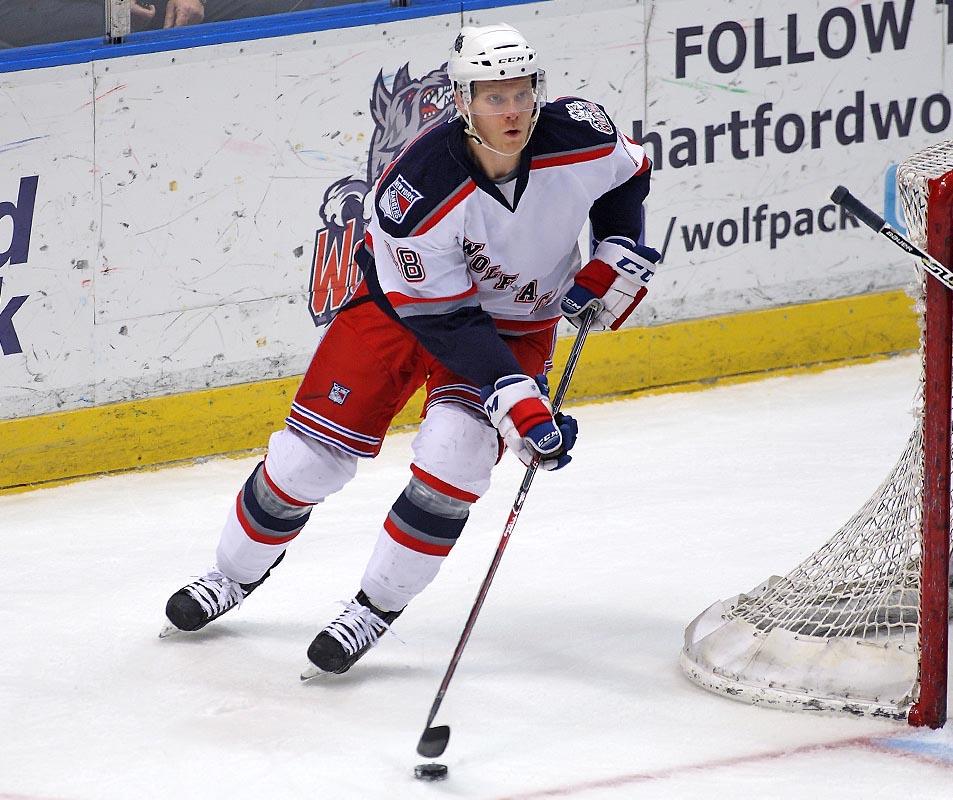by Bob Crawford || AHL On The Beat Archive
Hartford Wolf Pack defenseman Bretton Stamler is a hard-edged type of player, the kind of guy who consistently brings a “lunch bucket” mentality to his on-ice work.
Off the ice, however, the 26-year-old Edmonton, Alta., native, who joined the Wolf Pack on a professional tryout Jan. 4 from its ECHL affiliate in Greenville, is of a distinctly intellectual bent.
Stamler already has a bachelor’s degree in business administration from the University of New Brunswick, and his ambition is to attend law school, with the goal of becoming a player agent when his own playing career is done.
When asked recently what motivated him to consider that path, Stamler responded, “Following the (NHL) lockouts, in particular the one (in 2004-05) with (then-NHL Players Association head) Bob Goodenow, and then reading up on some of the resumes of (former NHL GM) Brian Burke, (GM Peter) Chiarelli in Boston, and then also following the careers of (Detroit Red Wings head coach) Mike Babcock and (former Tampa Bay Lightning head coach) Guy Boucher, both educated guys, made me think that once I got my BBA from UNB, pursuing something beyond that when my career’s over and allowing me to transition into something different.”
Stamler played four seasons of Canadian University hockey at UNB while getting his bachelor’s, after a five-year major junior career in the Western Hockey League. Throughout all those years of hard-battling hockey, he always strove to keep academics and intellectual pursuits a priority.
“I think my parents instilled that in me when I was in grade school, that followed up through high school,” Stamler said. “I didn’t take a ton of classes in junior, and then going into college, I had good grades and had a high GPA, and that academic environment is something I really enjoyed, especially in my third and fourth years. And I looked at a lot of different avenues beyond hockey, as far as doing a master’s in finance or an MBA or going into law school, and those are all things that I’m still interested in, but I’ve narrowed my focus more so towards law school once I’m done playing.”
Academic interests and intellectual stimulation are obviously a big part of the university experience, but Stamler has found that he has been able to broaden his non-athletic interests in all of his various playing situations.
“It’s more difficult, in major junior and in pro, because the focus isn’t based upon your grades or that’s really not part of it whatsoever,” he said. “In saying that, there’s definitely guys, on all teams that I’ve played on, that you can have conversations with them beyond hockey, or even on the business aspect of hockey, and that’s refreshing too. It’s always nice to find a guy or two that shares the same interests or is willing to talk about things other than X’s and O’s on the ice.”
With his bachelor’s work complete, the next step for Stamler will be to take the LSAT, the universal “entrance exam” for law school, which he hopes to do this June. If he scores well enough, he will be qualified to begin law studies any time in the following five years.
“I don’t have a timeline where I want to go to law school specifically,” Stamler said, “but I do know hypothetically, worst case, say I was to sustain an injury and couldn’t play hockey, without the LSAT I still can’t apply to law school. So if I get the exam out of the way, I can still continue to play hockey, but at some point if I want to return to law school, I can submit my application without having to wait a full year to write the exam and then get all my marks in.”
Once he accomplishes passing the LSAT, Stamler does not have a specific law school targeted as his top choice.
“Most likely it would be in Canada, because in the U.S. I’d be considered an international student,” he said. “I’d like to go back to the west, maybe the U of C (Calgary), a lot of good contacts out there and it’s a good school too. U of A (Alberta), back to UNB, U of T (University of Toronto) is the top school in Canada, but tuition is extremely high, so that one I would have to wrestle with a little bit. And Dalhousie, in Halifax (Nova Scotia), is another strong school and I really like the Maritimes.”
Throughout his hockey career Stamler seems never to have been intimidated by anything that happens on the rink, despite his fairly rough-and-tumble playing style. One might well wonder, though, is the prospect of three years of challenging law school work intimidating? According to Stamler, there is not an intimidation factor to the coursework itself, but there definitely is to another element.
“More so the financial commitment,” he chuckled, “because there’s a lot of outflow and not much inflow, but I’ve lived on a student budget for a while. And I’ve actually tried to do that even in pro, because it helps you save money for later on. So the financial commitment is probably the biggest deterrent to going back.”
The time commitment is huge as well, making it unlikely that Stamler will attempt to duplicate the feat of Hall of Fame goaltender Ken Dryden, who completed much of his law school work while simultaneously tending goal for the great Montreal Canadiens teams of the early 1970s. That is not to say, though, that Stamler might not try to mix some academic work into his pro hockey routine.
“If my career were to be prolonged, I would definitely welcome the opportunity to take classes while playing,” he said, “because, as busy as we may tell people we are, we’re great at wasting time sometimes. So I think I could fit some time into my day to take a few classes every semester.”
Assuming that Stamler does get through all the rigors of attaining a law degree, he would be excited to bring his varied experience into the field of player representation.
“In my opinion, and obviously I’m just a player at this point, in comparing the resumes of agents who are NHLPA certified, with a lot of them, there’s either agents that have the academic background, or there’s agents that have the playing background but don’t have the academic background,” Stamler said. “So I think it would be a nice mix to be able to have some playing experience as well as having some academic background, meaning my law degree, because then I could relate to the player, obviously to their on-ice experiences, but could also serve them well with regards to contract negotiations and understanding the CBA and best representing my clients that way.”
It’s not hard to imagine that many high-level athletes would be eager for their agent to have that sort of nuanced perspective, and to have an individual like Bretton Stamler bring the same kind of battle level that he now shows on the ice, to the negotiating-table scrums at contract time.






































